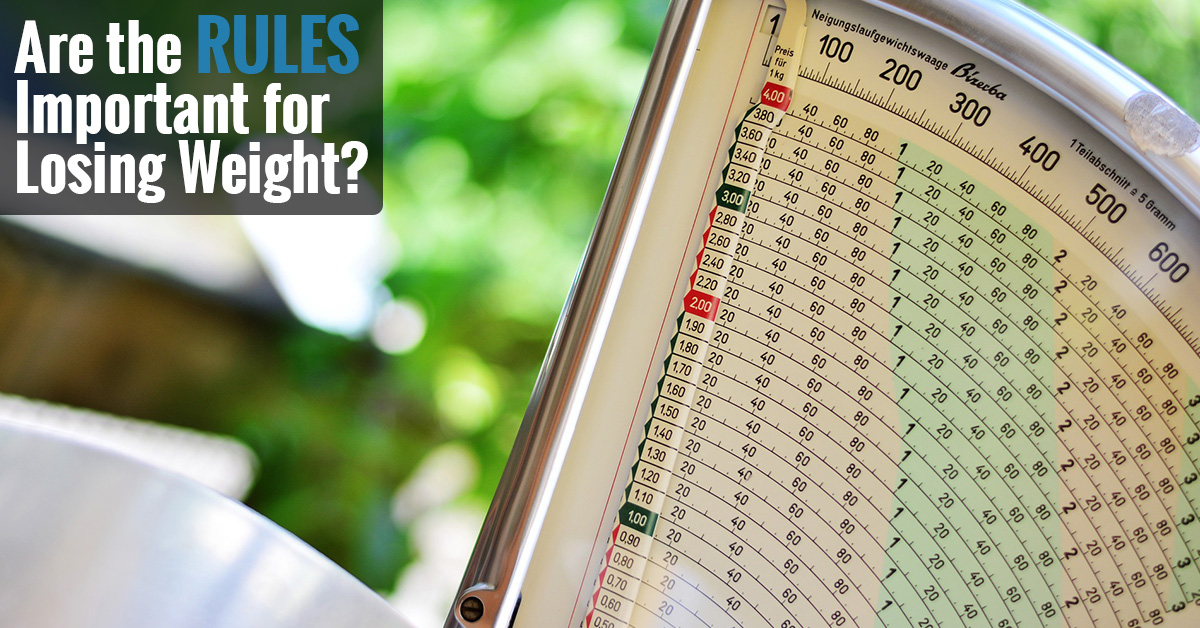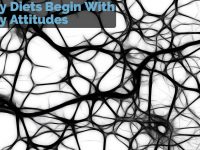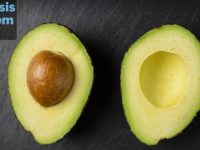This is the third installment in the Weight Loss series. Prior to this entry, we discussed the role of exercise in losing weight and attitudes towards food and dieting in general. If you haven’t read those yet, be sure to check them out!
Today, we’re discussing what some people might call the backbone of any weight loss diet—the rules. Rules are often perceived as having the utmost of importance, with news articles ranking diets and countless headlines comparing this diet to that diet. It’s the rules that make diets seem different, and as a result it’s the rules we so often focus on. Are rules really that important, though? That’s the question we’ll be answering today.
Rules Differentiate Diets, but Do Little Else
What makes a Mediterranean diet different from a Paleo diet? What determines if you’re vegan or vegetarian? In both cases, and countless similar ones, it’s the rules—what you’re allowed to eat, when you’re supposed to eat, where you’re supposed to buy food from, etc. To be sure, there are philosophical differences as well, but for most people these are not the differences that matter; the differences they’re interested in are the ones that help them lose weight, not orient their diet in the universe.
In this way, rules are certainly important; without rules, there would be no way to differentiate diets. However, the “hardness” of rules hides a simple truth: the rules are also arbitrary. Different people successfully lose weight on an impressive array of diets not because the rules are in-and-of-themselves important, but because they guide a person towards the dietary behaviors that are actually important—dietary conscientiousness and caloric restriction.
These are the “core rules”—the only rules that really make a difference. Any diet that encourages a person to be mindful about what they eat and also helps them restrict how many calories they consume will likely be successful, but it has little to do with specifics such as which foods are allowed or where those foods are sourced from.
This is why no diet results in significantly different weight loss when compared to others in a scientific setting. The individual rules do not lead to different outcomes because they have no inherent magic. Cutting out grains can help a person reduce calories, but otherwise has no effect; the same can be said for cutting out meat, or for increasing the number of fibrous veggies one eats, or any other particular rule a diet suggests.
Diets and Sports: An Analogy
Across the world, humans participate in a huge number of different sports. Each sport is different, and those differences are found within the rules. Yet despite the wide variety of sports and the rules that define them, we cannot look at any particular sport and say “that sport has the best rules, and so everyone will have the most fun participating in it.” At most, we can say that we ourselves enjoy a particular sport and that we find its rules appealing.
There are few rules—perhaps no rules—that cannot be altered in some way within a sport and still result in an enjoyable game. Change the ball size, the size of field, the number of players, the way you score, and you will still have a sport, albeit one that may no longer resemble the initial sport. Rules may define a particular sport, but if you take a step back, you can understand that the rules are actually arbitrary when it comes to defining what a “sport” is in general.
Depending on your own goals for sport, the actual rules may be more or less important. If you are a professional soccer player, the rules are critical. On the other hand, if your goal is to have a good time with your friends, you can play soccer without much regard to most of the rules.
Diets are similar, except that there’s no such thing as a “professional dieter” (unless you count spokespeople for diets or people who profit off specific diets like authors); the rules are always arbitrary while dieting! You can take any “diet”, tweak it, and—assuming you don’t overdo the calories—end up with another effective diet. The Paleo diet, focusing on whole foods, is just as effective if you decide to also eat whole, unprocessed grains.
This ties us back to the last article in this series, because all the rules really do is create an enjoyable (or miserable) experience for each individual. Some people love baseball, others hate it. Some people love keto diets, others feel deprived on them. Expecting the same diets to do the same work for everyone is like expecting everyone to love your favorite sport. The best sport—and the best diet—is the one you enjoy.
Rules Build the Framework
So far, it may seem like I hold rules is disregard, but that is not true—I hold rigid adherence to the rules in disregard. Perhaps that’s not the right way to phrase it either, but what I mean to say is that it’s important to not get too zealous about the rules. You can and should hold yourself to the rules you agree upon for yourself, but you should be clear about why these rules are important. Rules help you build a framework for your diet, but no individual rule guarantees weight loss, and breaking the rules doesn’t guarantee failure.
Rules are also important in simplifying a diet, which can help some people make better choices. Sometimes, it’s overwhelming to be faced with what can seem like endless choices about what to eat, and that leads to mental fatigue and ultimately poor choices. By defining what’s allowed and not, choices are reduced and it’s easier to decide what’s “right”.
One thing to note is that over time, most dietary rules should become less important, not more. A novice in anything—including a new diet—needs more structure until they get comfortable with making the right decisions. Eventually, experience will help you understand situations contextually, at which point you can break rules knowing that they are unimportant in the moment. Remember, the goal of any diet isn’t to become a master of following the rules, but to become a healthier person, and that requires flexibility, not rigidity.
Some Rules Are More Common
Even if most rules are arbitrary, many are similar from diet to diet. I won’t go so far as to say these rules are strictly necessary, because I can guarantee you it’s possible (if not pleasant) to lose weight without adhering to them (such as the infamous “Twinkie Diet” from a number of years back), but I will say that these rules that show up time and again do so because they lead to easier, more pleasant, and healthier weight loss diets.
If you’re planning on losing weight, these are rules I wouldn’t hesitate to recommend:
Limit Processed Food
Processed foods tend to be calorie-dense, which make them a poor choice for weight loss as they aren’t particularly satiating. Furthermore, most processed foods are designed to be as appealing as possible, making them more likely to overcome our body’s built-in defenses against caloric overconsumption.
Aside from their caloric density and hyper-appealing nature, there’s nothing else about processed foods that will limit weight loss. This means that special “diet-friendly” versions of processed foods, like Paleo-friendly crackers made from sweet potatoes, are usually nothing more than clever marketing and are no better (or worse) than their alternatives. It’s best to limit all processed foods rather than try to find “healthy” versions.
Eat More Whole Foods
This is the reciprocal of the previous rule. Where processed foods tend to be calorie-dense, whole foods tend not to be—even whole foods that get a bad rap, like potatoes (which are actually the most satiating food we know of, at least when boiled plain), are filling for the calories they contain.
Again, aside from a lack of caloric density and increased satiety, there’s nothing special about whole foods when it comes to losing weight. Whole grain kamut (a type of wheat) will encourage just as much dietary control as baked sweet potatoes, despite being an oft-vilified grain.
Eat More Fibrous Vegetables
This is more of an addendum to the above, but we’ll discuss it separately. Fibrous vegetables are bulky and low-calorie; when consumed with other, caloric whole foods, they increase satiety and decrease caloric intake. They help the stomach fill faster, triggering fullness, which can decrease total calories consumed.
By themselves, they are unlikely to leave you feeling satisfied for more time than it takes for your stomach to start emptying. Since they do not contain many calories, there is no postprandial “reward” and no diminishing of hormonal hunger. There’s nothing wrong with eating veggies by themselves, it just is unlikely to leave you feeling full for very long.
Cut Sweetened Beverages
Sweetened beverages, including sodas and juices, are easy to drink and don’t give much satiation bang for their caloric buck. Even fancy juices advertised specifically for weight loss are essentially less healthy, less effective versions of the foods that went into them.
If you’re going to use liquids as meals, you’re much better off making smoothies—that is, simply blending whole foods rather than extracting their liquids. This way you still get the fiber, which will help with satiety.
Up Your Protein
Contrary to what you might expect, you may actually want to consume more protein while losing weight than while trying to put it on. This is because during weight loss—an inherently catabolic period—our body will also attempt to shed excess muscle. Dietary protein fights this muscle protein catabolism, and more than normal may be useful since you’re not providing the calories that would otherwise help muscle anabolism work.
Protein has a second, more mundane benefit as well: it’s essentially low-calorie, even if it’s technically about as caloric as a carbohydrate. Protein isn’t metabolized natively for calories by our body—before we can use the energy protein contains, we must first convert it to glucose (or ketones). This conversion requires calories, which drops the actual energy derived from a gram of protein to about 2.66 calories, or about 66%. In reality, it may be even lower since that assumes we’re burning 100% of the protein we’re consuming, which is unlikely—but we also don’t want to go too crazy with our math. The main point is that protein goes a lot further than carbohydrates or fats, and a high-protein diet for weight loss can be beneficial.
Measure Your Food
This shouldn’t be a permanent thing, but few people are innately good at “eyeballing” portion sizes and actually being correct. Measuring food allows you to calibrate your eyeballs and more accurately estimate portion size down the line.
For the purposes of measuring, I highly recommend a kitchen scale over volumetric measurements like measuring cups and spoons. Not only are such utensils susceptible to error (due to air pockets or compacting for example), they’re also harder to use and clean. With a kitchen scale, you just tare down to zero, measure a single ingredient, tare again, repeat; it’s fast, easy, accurate, and requires no extra clean-up.
Avoid Pseudoscientific Diet Rules
There are plenty of reasonable diets out there, but there are also a handful that are either based on ridiculous, unscientific notions or have rules that reflect such notions. These diets and rules may not actively harm your diet, but they add nothing to it, either.
The most common type of pseudoscientific diet rule you’ll see is unnecessary food restrictions, such as “no grains”, “no legumes”, or “no fruit”. Outside of specific allergies, there is no evidence that such foods cause harm or would impede weight loss. In fact, most foods that are commonly restricted have a plethora of evidence that they are in fact healthy and may help with weight loss.
There are also diets which concern themselves about the acidity and alkalinity of foods, which have essentially zero effect on our health. Avoiding foods that are one or the other adds nothing except a burden to your diet.
Some diets make claims about the times you eat, but again, there’s no time that has been demonstrated scientifically to be harmful—yes, you can even eat 15 minutes before swimming! No matter how you schedule your daily meals, it’s the calories they contain that will ultimately be more important.
In many cases, the rules themselves may be viewed as a simple, short-time restriction, but remember that your goal is to build long-term, healthy habits, not short-term habits based on poor evidence. You don’t necessarily need to completely avoid diets that contain pseudoscientific rules, either, but you should at least think critically about those rules, alter or ignore the ones you can, and stay away from diets that demand perfection lest you fail to see results—a convenient way for a bad diet to put the responsibility of failure solely on the dieter.
Wrapping Up Weight Loss
Are rules important? Individually, yes; absolutely, no. Rules help you define how you eat, and that helps you build habits—but no diet has the monopoly on “good rules”, and many diets can be successful despite having different rules.
Beyond the rules, it’s important to think long-term about weight loss. Yes, it may be a short-term goal—few people want to think about losing weight for the next five years— but you’re really working to change your diet and lifestyle in such a way that weight loss and health come more naturally. It may take a bit longer, but the results will last longer, and in the meantime you’ll have obtained a lot more.
If you have a question about weight loss, I’m eager to hear and answer it. Leave it in the comments or email it in and I’ll reply. If I get enough questions, or get questions that demand lengthy answers, I’ll probably post an article answering them as well. Until then!














